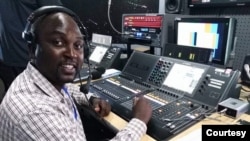Police in Malawi have seized mobile phones and laptops from at least 14 journalists working at the state-run Malawi Broadcasting Corporation or MBC. The journalists are suspected of running a fake Facebook account bearing MBC’s name, where they allegedly posted false and anti-government stories. Press freedom groups have faulted the police for invading the journalists’ privacy.
A spokesperson for the Malawi Police Service, Peter Kalaya, told VOA that the probe is in response to complaints from the management of the Malawi Broadcasting Corporation.
"In the process of the investigations, we secured a search warrant in the court of law which we have used to confiscate electronic gadgets from suspects," he said. "And the gadgets include phones and laptops."
Kalaya declined to reveal the exact number of people being investigated and how they were identified for allegedly committing cybercrimes.
However, local media reports say that 14 journalists associated with MBC, including some who have left the channel, have had their devices searched.
MBC Public Relations Manager Chisomo Mwamadi refused to comment on the investigation, saying the channel has left everything in the hands of police.
Greyson Chapita, former controller of news for MBC TV in Blantyre, is among the suspects.
He told VOA that on Wednesday, police officers forced him to log into all his devices which have access to the internet.
"They searched my laptop," he said. "They were so much into my Facebook account. They did not check my emails, but they looked for the passwords and Facebook recovery in the system and other emails that were in the system. They check close to 20 minutes, and they took some screenshots."
Chapita said police returned his devices after one of the police investigators said they did not find what they were looking for.
Chapita said he stopped accessing all online platforms for MBC long before he stopped working at the state-run media organization.
"In fact, that was four years ago," he said. "I have nothing to do with MBC anymore. And for them just invading my privacy just like that you know, torturing us, traumatizing my 12- year-old daughter. You know being accused of running a fake Facebook account, that’s absurd. I am a church elder at my church. How are people going to look at me? I am so bitter."
Some journalists who had their devices confiscated refused to give their names for fear of reprisals but told VOA they fear police will gain access to confidential information they shared with news sources.
"This is something which is worrying because it puts them at a vulnerable position because everything that the police might access or even the management at MBC might access which they were not supposed to access can be used to harm their careers, can be used to harm their sources," said Golden Matonga, chairperson for the Media Institute for Southern Africa in Malawi.
However, national police spokesperson Kalaya said journalists are not immune from any type of police investigation.
"Some of the people we are following up are not employees of the MBC," he said. "And you cannot run away from a criminal investigation just because you are a journalist or because you are in this or that profession. No person is above the law."
Kalaya said police will keep confidential all the private information they find in the confiscated phones and laptops. He said the equipment will be returned after the police are done with their investigation.





